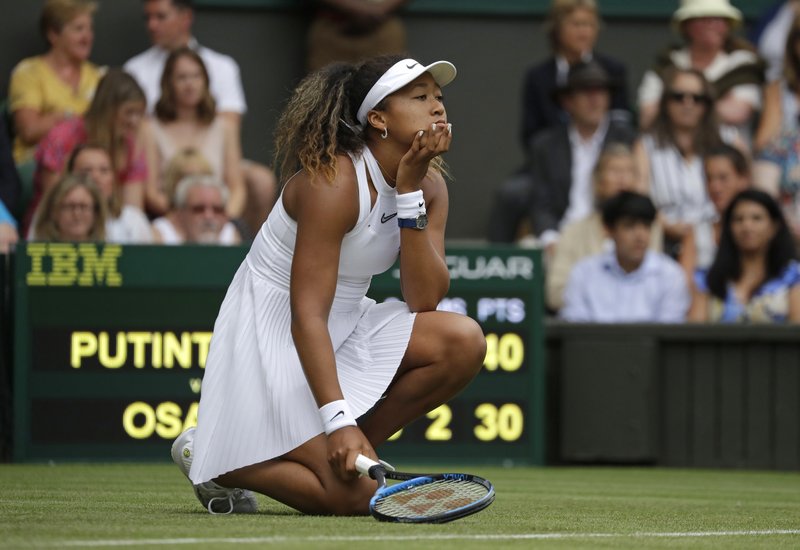‘Can I leave?’ At Wimbledon, Osaka takes 2nd Slam ‘L’ in row

Japan’s Naomi Osaka reacts as she plays Kazakstan’s Yulia Putintseva in a Women’s singles match during day one of the Wimbledon Tennis Championships in London, Monday, July 1, 2019. (AP Photo/Kirsty Wigglesworth)
WIMBLEDON, England — Naomi Osaka’s 16-match Grand Slam winning streak has been followed by a two-match losing streak at majors, and as she haltingly discussed her early exit at Wimbledon at barely above a whisper Monday, she suddenly stopped.
“Can I leave?” Osaka asked the news conference moderator to her left. “I feel like I’m about to cry.”
Article continues after this advertisementAnd that was that. Osaka walked out. On a wild Day 1 at the All England Club, No. 2 Osaka was the highest-seeded and most-accomplished player to leave the scene, beaten 7-6 (4), 6-2 by Yulia Putinseva.
Other highly regarded players who were defeated included five-time Wimbledon champion Venus Williams, 2017 French Open champion Jelena Ostapenko and 2019 French Open semifinalist Marketa Vondrousova on the women’s side, and No. 6 Alexander Zverev and No. 7 Stefanos Tsitsipas on the men’s side.
For Osaka, this follows her third-round loss at the French Open in May.
Article continues after this advertisementBefore that, she had won her first major title at last year’s U.S. Open, then continued the unbeaten run by adding the trophy at the Australian Open in January. That made her only the 10th woman to win those two tournaments back-to-back, and the first tennis player from Japan to top the WTA or ATP rankings.
Shortly after that, Osaka split from coach Sascha Bajin, saying: “I think my reason is I wouldn’t put success over my happiness,” but offering no further explanation.
It was, at the very least, curious timing. When Osaka was asked Monday about whether there could be a correlation between Bajin’s departure and her recent results, she replied: “I don’t think it’s related at all.”
Osaka, who dropped one spot behind new No. 1 Ash Barty last week, found that her biggest issue against the 39th-ranked Putinseva was accuracy. Osaka ended up with 38 unforced errors, 31 more than her opponent.
“I feel like I should have been able to play well today, because I wasn’t practicing bad,” said Osaka, who dropped to 0-3 against Putinseva, including a loss on grass at a tuneup tournament last month. “You never know what’s going to happen during matches.”
Seven of Osaka’s eight losses in 2019 have come against players ranked outside the top 20.
Her mood was quite a contrast to that of Putinseva, naturally.
When a reporter wanted to know why she’s had so much success against Osaka, Putinseva erupted into peals of laughter after saying: “I’m not going to tell you my secrets.”
IVANISEVIC JOINS DJOKOVIC
Novak Djokovic’s entourage was joined by a new member at Centre Court on Monday: 2001 Wimbledon champion Goran Ivanisevic, the only man to win the tournament as a wild-card recipient.
Ivanisevic sat next to defending champion Djokovic’s long-time coach, Marian Vajda, during the top-seeded Serb’s 6-3, 7-5, 6-3 victory over Philipp Kohlschreiber.
“We both agreed that we were looking for someone that was a former champion, someone that knows how I feel on the court, someone that has been through that,” said Djokovic, who is pursuing a fifth Wimbledon title and 16th major trophy in all. “We agreed with the … idea of introducing a new coach to our team, an addition like Boris Becker was back few years ago. It was a very successful period with Boris. We’re hoping we can have the same with Goran.”
KARLOVIC STILL WINNING AT 40
Even at 40, Ivo Karlovic isn’t showing any signs of slowing down, particularly when it’s time for him to serve.
The 6-foot-11 (2.11-meter) Karlovic became the oldest man to win a match — or even compete at all — at Wimbledon since 1975, beating Andrea Arnaboldi 6-4, 6-4, 7-6 (4) with the help of 20 aces.
It’s yet another age mark for a player who is becoming as known for his graying hair as his thunderous serve. In May, Karlovic became the oldest man in 46 years to win a match at the French Open.
“Well (it means) that I’m old,” Karlovic joked when asked about the significance of those marks. “Yeah, obviously it’s an achievement to be able to have this longevity.”
He feels fairly certain it won’t take another four decades for a 40-plus player to win Grand Slam matches; Roger Federer turns 38 on Aug. 8.
“Today, everybody does a lot of work off the court, which in the ’80s maybe wasn’t the case,” Karlovic said. “So they can prolong their careers. If they can still win at the age of 38, 39, they’re not going to stop.”
Karlovic’s serve-and-volley style isn’t used much by most other players these days, but is well suited to the grass at Wimbledon. On Monday, he never faced even a single break point.